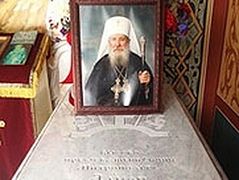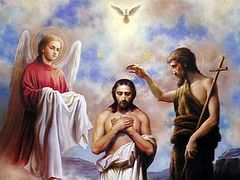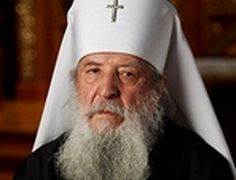This Friday, His Eminence Metropolitan Laurus, First Hierarch of the Russian Orthodox Church Outside of Russia, who died last Sunday, will be buried in Holy Trinity Monastery in Jordanville, NY, where he served as abbot. He played a crucial role in the reunification of the Orthodox Churches.
It is symbolic that Vladyka Laurus died on the first Sunday of Great Lent, the feast of the Triumph of Orthodoxy. His spiritual and historic role in the life of the Church served exactly that—the triumph of Orthodoxy. The Prior of Moscow’s Sretensky Monastery, Archimandrite Tikhon (Shevkunov) talks with Russkaya Gazeta about Metropolitan Laurus’ role in the unification of the Churches.
RG: Metropolitan Laurus’ role in the reunification of the Russian Churches is called crucial and preeminent. What was it that depended upon him personally?
Archimandrite Tikhon: The question of the reunification of the Churches depended enormously on two persons—His Holiness Patriarch Alexy II and Vladyka Laurus. All that one or the other had to say was—not even a categorical "no"—but "the time has not come," and the process would have been stalled for many years. But both one and the other said "Yes, this must happen." And a very complicated, painstaking effort began. Vladyka Laurus understood perfectly that there were more than a few proponents of unification. But when this process began, there may actually have been more opponents.
RG: Who opposed it, and why?
Archimandrite Tikhon: A large percentage of people simply did not believe in the changes in Russia as a matter of principle. Some were perfectly satisfied with the "isolation" of the Russian Church Abroad. Some simply disdained today’s Russia. And Vladyka understood that at his age, and with his very bad health—for he had serious illnesses, he underwent complicated brain surgery—the task of reuniting the Churches would cause him great and persistent stress. He knew that he would not only endure criticism but would be denigrated. He knew that he was fulfilling the will of God and his historic duty as the Primate of the Church Abroad. He made this the most important goal of his life, he drew to a conclusion one period in the life of the emigre Church, he fulfilled the legacy of her founders on the reunification with the Russian Orthodox Church in the Fatherland after the government that promoted ideological godlessness and militant atheism would disappear into nothingness. For decades they believed that this would happen. And Vladyka Laurus turned out to be the one who completed this stage in the life of the Russian world.
RG: What kind of person was he?
Archimandrite Tikhon: First of all, he was a man of prayer. He never employed any other means of persuasion other than prayer, and by serving as an example. When he visited dioceses and churches which disagreed with his decision, he remained silent and prayed. In most cases, his prayer was of greater effect than any agitation, rebuke, strictness or punishment would have been. This was a genuine monk. And, of course, a kind man. I do not know of one instance when he imposed punishment upon anyone, scolded or reproached anyone, that was simply not his style. There are probably a very, very few people in this world who know the power of their prayer and could use this incomprehensible method for such a high office as he occupied. Today, we bid farewell to just such a person. His life ended with a clear conscience and with the lofty sense of having completed his obligations.
RG: What is notable in his biography?
Archimandrite Tikhon: From a lay point of view, there was nothing special in his life. The most amazing thing was his devotion to Divine calling. From his youth, he entered a monastery and traveled this path towards God his whole life. There were no remarkable features in his life… From the temporal viewpoint, his biography is perfectly dull and unremarkable, as was the life of most saints of the Russian Orthodox Church.
Elena Yakovleva
Russkaya Gazeta



